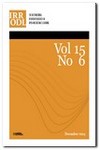 Par Frédéric Duriez. La chimie a une connotation négative lorsqu'on l'associe à l'univers de la gastronomie. Elle serait un élément d'une cuisine artificielle, dangereuse pour la santé, éloignée du naturel et du terroir. Voir l'article...
Par Frédéric Duriez. La chimie a une connotation négative lorsqu'on l'associe à l'univers de la gastronomie. Elle serait un élément d'une cuisine artificielle, dangereuse pour la santé, éloignée du naturel et du terroir. Voir l'article...
Development and testing of a m-learning system for the professional development of academics
 In the present study, a mobile learning system for the professional development of academics was developed by design based action research, and the perceptions and experiences of the academics using this system were examined. In the first phase of this design-based action research, the research question was defined. In the second phase, a m-learning system called “Mobile Academic Research Support” (MARS) was designed as a solution to the problem, and the IOS mobile application for this design was developed. More...
In the present study, a mobile learning system for the professional development of academics was developed by design based action research, and the perceptions and experiences of the academics using this system were examined. In the first phase of this design-based action research, the research question was defined. In the second phase, a m-learning system called “Mobile Academic Research Support” (MARS) was designed as a solution to the problem, and the IOS mobile application for this design was developed. More...




/https%3A%2F%2Fprofilepics.canalblog.com%2Fprofilepics%2F1%2F0%2F1076071.jpg)